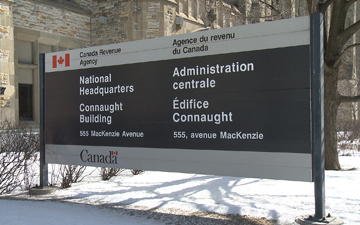A world of difference between CRA civil and criminal tax audits

The Income Tax Act is clear on Canada Revenue Agency civil and criminal audits. But what happens when the goal of a CRA civil audit is to lay criminal charges?
TORONTO, May 8, 2018 – Most accountants have dealt with Canada Revenue Agency tax audits and auditors many times in their careers. The auditor will request various books and records from the taxpayer and the accountant that are usually provided as a matter of course. The power of the auditor to request those records, and to attend at the business premises of the taxpayer and ask questions, is set out in section 231.1 of the Income Tax Act. The Act gives the tax auditor broad audit powers for administration and enforcement.
This is a normal part of the tax audit with which accountants are well familiar.
What happens if the taxpayer does not cooperate? Section 231.7 allows the CRA to apply to the Federal Court of Canada for a compliance order requiring that the taxpayer respond to the section 231.1 requests. At this point, the accountant is out of the normal tax audit process and into tax lawyer territory.
While the CRA has the ability to force a taxpayer to provide information, that right is not unfettered. While most of what the CRA does is to audit and collect taxes, there is also a criminal power woven into the fabric of the Income Tax Act. While we might say that the tax man wears two hats, it may be more accurate to say that he has two faces. And which hat or face is being worn defines the rights and limitations of the CRA’s audit powers.
When criminal law is invoked
As soon as criminal prosecution is invoked in Canada, the Charter of Rights and Freedoms is automatically applicable. In particular, section 7 of the Charter provides protection for the right to life, liberty and security of the person. This means that, when the criminal law is invoked, including the criminal tax process, personal protections come into play. A demand for information invokes that protection if there is a criminal tax investigation.
This issue has been dealt with by the Supreme Court of Canada in R. v. Jarvis 2002 [2002] 3 SCR 757, where the court set out tests for determining when a civil audit has become a criminal investigation. The Court said that when the predominant purpose of the CRA investigation is for a penal purpose, section 7 Charter rights kick in.
In Jarvis, the Court gives seven factors to be used in determining if the predominant purpose of the investigation is civil or penal [paragraph 94 of the judicial decision on CANLII].
These tests are applicable in the normal audit scenario where a tax auditor commences a regular civil tax audit, comes across data that suggest tax evasion, and refers the file to CRA investigations. The factors will allow a judge to determine where the facts lie on the audit versus criminal investigation and, therefore, the protections to which the taxpayer is entitled.
When criminal charges are the object of civil audits
While the tax audit scenario is common, it is not unique.
On Feb 14, 2018, and again on May 3, 2018, the CRA made unprecedented public announcements of the execution of search warrants related to Panama Papers leaks. The use of search warrants is mandated by section 7 Charter protection in a criminal investigation. So, we have a clear case where CRA is exercising its criminal powers and there is no issue about 231.1 and Jarvis.
However, there is another plan that is not that uncommon — when the CRA conducts focused tax audit projects into known tax problems.
The CRA has entered into public relations campaigns to encourage tax compliance and to assure the Canadian public that it is dealing with tax evasion. The underground economy and unreported offshore income are each well-known targets of the CRA's public relations and special audit programs.
When a taxpayer is selected as a result of one of those tax audit initiatives, the CRA proceeds by way of their normal civil audit route. However, one of the clear purposes of the audit campaign is to bring criminal tax charges. The Jarvis rules may not be met in these cases since the process is being started by CRA on the civil audit side.
In my opinion, this is the wrong way for CRA to proceed. This is really an exception to Jarvis and Charter protection ought to be available in these instances. It is unfair to use the civil audit power to compel a taxpayer to provide information to be used in a criminal tax prosecution that is inevitable but not yet commenced due to the institutional way in which CRA approaches these cases.
I expect that the right facts will present themselves and a taxpayer appeal will be made to the Federal Court of Appeal. While it will probably take leave to the Supreme Court in order to resolve the issue in favour of the taxpayer — and leave in tax matters is very hard to obtain — the issue is important enough that I hope the Court will hear it.
David J. Rotfleisch, CPA, CA, JD, is the founding tax lawyer of Rotfleisch & Samulovitch P.C., a Toronto-based boutique tax law firm. He appears regularly in print, radio and TV. With over 30 years of experience as both a lawyer and chartered professional accountant, he has helped start-up businesses, resident and non-resident business owners and corporations with their tax planning, with will and estate planning, voluntary disclosures and tax dispute resolution including tax litigation. Visit Taxpage.com or contact David through david@taxpage.com.








(0) Comments